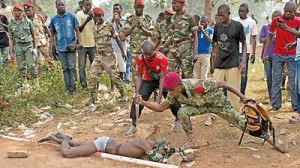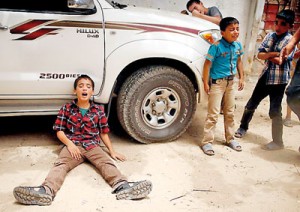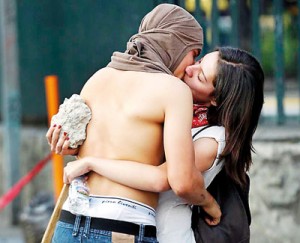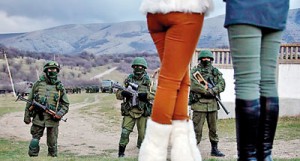Sunday Times 2
Stories behind the top shots of 2014
View(s):Reuters / Wednesday, February 05, 2014

A Central African Army soldier stabs the corpse of a man, who was killed as he was accused of joining the ousted Seleka fighters, in the capital Bangui, February 5, 2014. REUTERS/Seigfried Modola
Bangui, Central African Republic: I was heading back to the hotel to file after a ceremony in Bangui, where the interim president had promised to reinstate the country’s armed forces, urging for national unity. I was in the taxi for just a few minutes when my fixer asked me to come back as people were attacking and killing a man.
The crowd was in a violent, bloodthirsty frenzy and I tried to stay alert; an angry crowd can be dangerous, unpredictable and very scary, something I had unfortunately witnessed there before. The lifeless body of the victim, suspected of having joined the former Seleka rebel group, was being dragged, kicked, stabbed and pelted with rocks by Central African Republic soldiers.
I believe this picture is a strong reminder of how deep the thirst of revenge runs in the country and how difficult it will be for any internal or external force to stabilize and bring long lasting peace in the Central African Republic.
Reuters / Sunday, July 13, 2014

The son (L) of one of the members of Tayseer Al-Batsh's family, who hospital officials said were killed in an Israeli air strike, mourns during their funeral in Gaza City, July 13, 2014. REUTERS/Mohammed Salem
Gaza City: The strike on the family home of Al-Batsh, Gaza’s police chief, killed 18 people. Moments before taking this photo, mourners brought out the bodies of the family members and their relatives started to cry and shout. Suddenly, this boy fell on the ground and burst into tears shouting: My dad, my dad.
While I was shooting this picture, loud explosions from air strikes could be heard and battles from the ground offensive were ongoing. The situation was risky and I had to take the pictures quickly and leave the area as fast as possible. This picture has affected me the most from the war. As a father, I was totally shocked and sad to hear this boy crying out for his dead father.
Reuters / Saturday, March 22, 2014

Anti-government protesters kiss during a protest against Venezuela's President Nicolas Maduro's government in Caracas, March 22, 2014. REUTERS/Christian Veron
Caracas, Venezuela: I was covering a Caracas rally against Nicolas Maduro’s government. Students were setting up a blockade and several had been arrested. They were organizing their counter-attack against the police when this girl, ironically the daughter of a government employee, suddenly appeared with a stone in her hand. I pointed my camera towards her as she walked up to her boyfriend and kissed him intensely in the midst of disaster.
The challenge and the biggest reward of this picture was capturing something different to the tear bombs and shooting, an intimate and personal moment in the middle of chaos, something with soul and heart.
Reuters / Wednesday, March 05, 2014

Local women watch armed men, believed to be Russian soldiers, assemble near a Ukrainian military base in Perevalnoe, March 5, 2014. REUTERS/Thomas Peter
Perevalnoe, Ukraine: During Russia’s occupation of the Crimean peninsula in Ukraine, masked men without insignia had appeared at Ukrainian army bases and important transport hubs all over the peninsula. Although they declined to say who they were, their Russian accents, military kit and license plates left little doubt that Moscow had sent them.
Reuters / Sunday, August 03, 2014

Three men found guilty by a Somali military court of killing civilians and masterminding a recent attack on the Presidential Palace stand tied to poles shortly before they were executed by a firing squad in Mogadishu, August 3, 2014. REUTERS/Feisal Omar
Mogadishu, Somalia: I was covering the execution of three Somali men who were accused of being members of Islamist militant group al Shabaab.
I took the photo while the men were still alive and tied to poles. Once they were shot, I could see blood gushing from their head, chest and stomach. They died within seconds, but we were not allowed to take pictures of their dead bodies.
The story really affected me and I panicked because I was watching human beings being executed.

